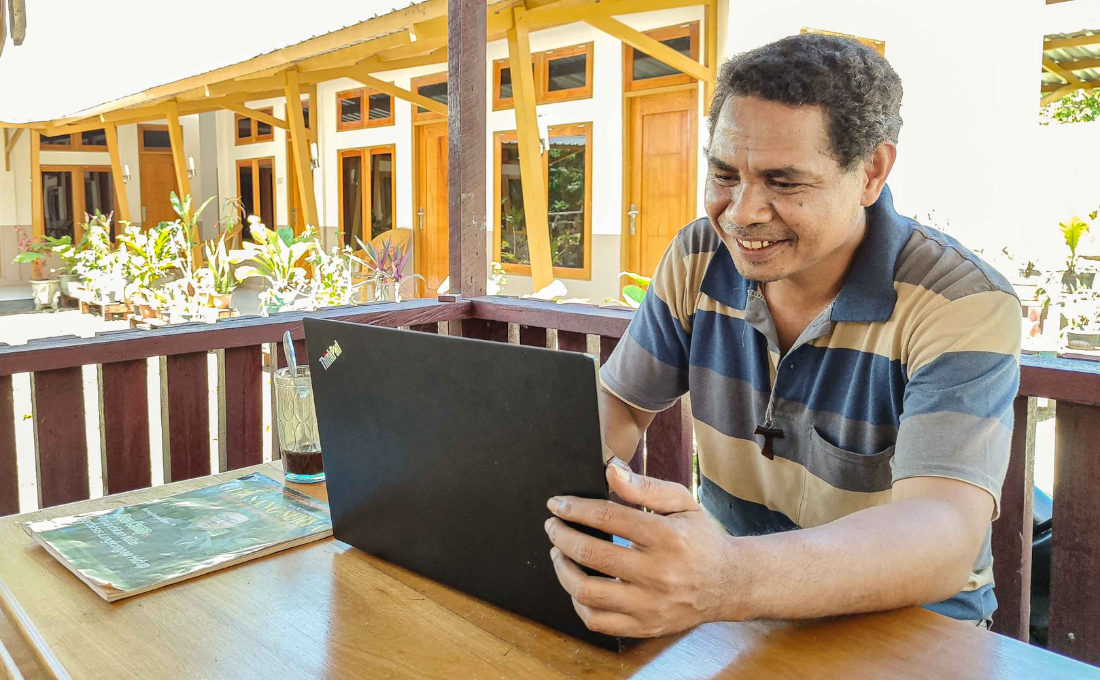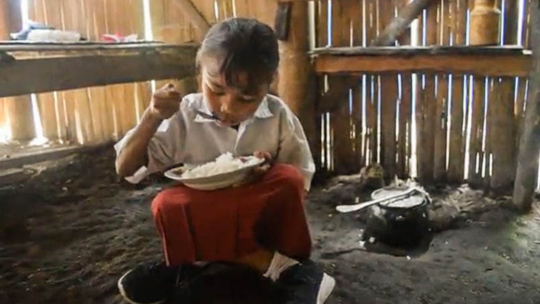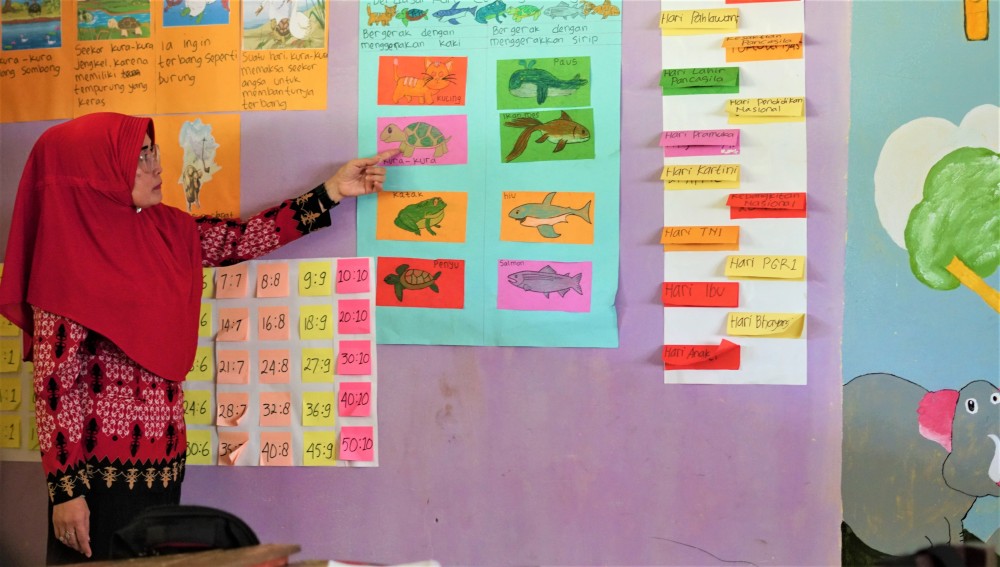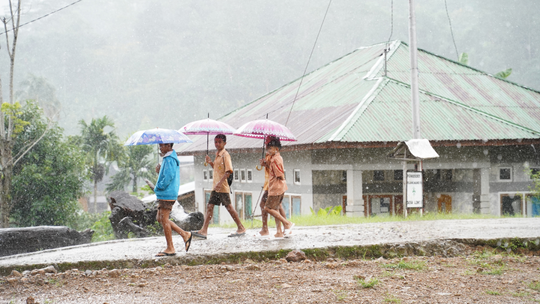Behind the Scenes: Local Partners Process Together to Make Papua a Land of Peace

Incidents of violent conflict always cause victims, including children and other vulnerable groups feeling unsafe, unable to study, and do their normal activities. The Community Transformation for Peace in Papua/NOKEN Papua program, a collaboration between WVI and church partners, seeks to increase the capacity of civil society actors as community empowerment agents to build harmony. Local partners have the reputation, experience and capacity to engage grassroots communities. In the course of their work with the NOKEN program, local partners have experienced capacity building and relationship transformation, both in the organization, themselves, and the communities they assist.
That day, Father Remi was looking at his laptop when NOKEN staff visited. In the midst of his busy schedule, he and Kak Yan warmly welcomed them and took the time to have a friendly chat. "I'm entering data for the financial report, while checking the receipts too," said Father Remi. The report will be sent to the NOKEN Program accountant as a form of partner accountability every month.
Father Remi and Kak Yan are local partners who are part of the NOKEN program team. Father Remi and Kak Yan are under the Secretariat of Justice, Peace and Integrity of Creation of Franciscan Papua (SKPKC FP), a non-profit organization that is a Catholic pastoral care unit of the Province of Francis Ambassador of Peace Papua. In addition to SKPKC FP, the Evangelical Christian Church in Tanah Papua (GKI TP) and the Indonesian Gospel Camp Church (GKII) region IV Papua partner with the NOKEN program on the basis of a common vision: Papua, the land of peace.
The partners have a high level of experience in various ministries and are well known in the community. GKI TP has a mediation assistance center that has been actively mediating and increasing the capacity of mediators throughout Papua. GKI Region IV in the Papua Pegunungan Tengah has established an educational foundation, is involved in HIV/AIDS awareness raising and prevention programs, agricultural technology renewal, Healthy Toilets and Healthy Honai. SKPKC FP has facilitated trainings, advocacy, dialogues, and discussions on human rights, law, reconciliation, conflict resolution, trauma management, gender, human trafficking, and contextual social issues. These activities involved non-governmental organizations, local governments, security institutions, faith-based organizations, universities, mass media, as well as customary institutions. The experience and expertise of the partners enriches the program. WVI and partners share many resources and lessons learned in this collaborative program.
"I am very grateful that WVI and SKPKC share many things in this collaboration, especially the aligned vision of Papua, the land of peace. So far, our program at SKPKC has focused on the conflict analysis approach. Well, this NOKEN program has a new approach, namely, social cohesion, which means empowering the community to hold activities that unite various community groups. This complements our approach so far. I'm also happy that the experience of our facilitators has increased. Even those who have never been facilitators have the opportunity to learn here,'' said Father Sandro, coordinator for the NOKEN program from SKPKC FP. One of the NOKEN activities, digital literacy and multimedia training for youth, is also in line with SKPKC FP's regular agenda to improve the journalistic skills of youth. As told by Kak Yan, some of the participants of the NOKEN activities continued to participate in SKPKC FP activities because of their growing interest in journalism.
In addition to enriching the facilitators and routine agendas of each partner, the NOKEN program regularly seeks to strengthen the capacity of the three local partners, especially in program management. WVI and the local partners learn together from the introduction of a logical framework of goals and objectives to be achieved from each activity, activity and budget planning, implementation, and accountability according to the accountable standards.
"So far we never knew these technical things, and today's training really helped us," said Father Gaad, coordinator for the NOKEN program from GKII, after the financial and procurement capacity building. The partners also had the opportunity to directly apply this in the implementation of the NOKEN program.
"The work system, the administration is amazing. There are many small but important things learned, for example, informed consent in attendance list. This protects the organization when there is a problem. At first I found it difficult with reporting documents such as notes with all the rules, but when it was running, I thought it was good and important for accountability. The procurement system avoids cash, leaving less room for fraud. There is a basic written agreement for all activities and expenses. Vendor price comparisons also reduce the opportunity for nepotism. The point is that I am impressed with good planning, implementation according to plan, and regular evaluation of the system that has been running," said Father Remi with sparkling eyes. The online financial system used for current reporting is also considered useful for journaling, both in the program and internally at SKPKC FP, because it happens to work similarly to the system at SKPKC FP. "There are things that are not in theory but must be based on experience. Here I am grateful to be able to share my learning with NOKEN," he concluded.
The NOKEN partner team consists of a variety of ethnicities and roles: traditional leaders, religious leaders, assemblies or community member. But they all work together and share an interest in learning. "We are interested and plan to try the bidding process, anticipating if there are big expenses," said Father Remi. "If there are more new things, please share it with us," said Kak Yan later.
Mama Alfrida, a NOKEN team facilitator from GKI TP who is also an assembly member at her church, had a memorable experience when implementing the program. "This is the first time for me to make an activity report, especially with inserting pictures and attendance list to the report. At first I felt confused, but I'm glad I finally got used to it. The same goes for coordination. I used to coordinate within the congregation, but now I have to go and coordinate to the chassis and other churches all the way to the lake. But again, I'm happy to meet new friends and experience," she said. She also felt the benefits of NOKEN activities, especially since she first participated in the capacity building for women as agents of harmony. She feels that the material can be applied in everyday life, for example, learning to be more patient in facing challenges from various people and situations.
In addition to Mama Alfrida, several other partners also began to see benefit from the activities they implemented with the youth. "I see the youth getting more enthusiastic and creative. Now they don't use social media just for fun, but there is added value because they spread messages of harmony and highlight social issues such as violence against children and child marriage. I am optimistic that they will grow up to be a great generation," said Pastor Hagar, facilitator of the NOKEN team from GKI TP in Biak City. "There is a young man who used to be a drunkard and a provocateur, but after participating in digital literacy he is interested in participating in further trainings such as graphic design training by the Ministry of Manpower. He even became the head of the group of trainees," said Kak Yan.
Father Gaad is also often present directly to assist trainings, including the socialization of gender and reproductive health. "This is really a new thing for many people here, but it is very important to know, especially when it is delivered directly by professionals in the field of reproductive health. I am happy to see that those who participated in this training actively asked questions. We are ready to support these trainings to be held again," he said.
The observed and felt impact of the activities they prepared and directly assisted seems to have played a role in keeping alive the hope and enthusiasm in realizing the vision of Papua, the land of peace.
Writer: Andina Larasati (MEL-C Coordinator for NOKEN Project)
Editor: Mariana Kurniawati (Communication Executive)



